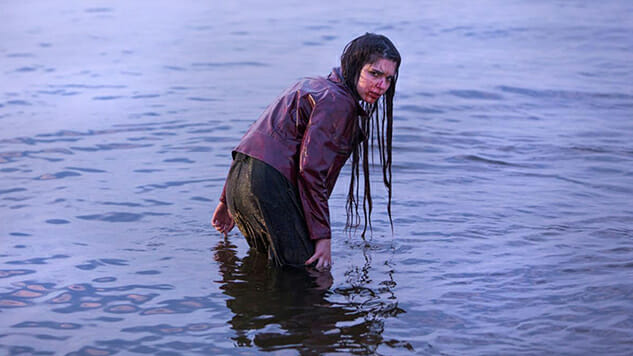The Lure

In Filmmaker Magazine, director Agnieszka Smoczynska called The Lure a “coming-of-age story” born of her past as the child of a nightclub owner: “I grew up breathing this atmosphere.” What she means to say, I’m guessing, is that The Lure is an even more restlessly plotted Boyhood if the Texan movie rebooted The Little Mermaid as a murderous synth-rock opera. (OK, maybe it’s nothing like Boyhood.) Smoczynska’s film resurrects prototypical fairy tale romance and fantasy without any of the false notes associated with Hollywood’s “gritty” reboot culture. Poland, the 1980s and the development of its leading young women provide a multi-genre milieu in which the film’s cannibalistic mermaids can sing their sultry, often violently funny siren songs to their dark hearts’re content.
The film begins in the water off a Polish beach, wherein two teenage mermaid sisters, Golden (Michalina Olszanska) and Silver (Marta Mazurek), swim and click to each other in a language not unlike that of dolphins. They’re only stopped when they hear a melody and voices: A drunken band goofs off on the beach and the camera’s slow approach on the edge of the water flavors the proceedings with a healthy dose of Jaws-like fear.
“Help us come ashore…we won’t eat you, dear,” they croon to the shaggy-haired heartthrob, bassist Mietek (Jakub Gierszal). Under their spell, his infatuation, as he heads nearer and nearer to the dreamlike beasts calling to him, is only interrupted by the piercing scream of the band’s singer (Kinga Preis). Smoczynska immediately situates the film between the realms of horror and erotica—a particularly youthful combination which any post-Goth audience members will snap up like herons feeding in the river. When the sisters accompany the ensemble back to their home base nightclub in a hazily-explained mixture of curiosity, hunger and attraction, this ambient anxiety remains. The pair are hired on as strippers and backup singers for the band because nightclub owners are sleazy and the duo have no qualms showing off their newly-obtained lower halves (they sprout legs when dry, regrowing their tails when wet).
Club audiences, as you may imagine, are entranced by the mermaids’ seductive transformations and voices. Regularly abandoning a strange subplot about a fantasy underworld of sorts to revel in disco-inflected musical numbers, the camera catches every piece of grime and dazzling sequin at hand. Some of these numbers are in the nightclub, others in a shopping montage—none are forgettable. The kitschy Europop covers the band lays down are an inescapably catchy foundation for the rest of the film’s insanity, leaving you to nod your head even when the Polish lyrics come steeped in their own linguistic idiosyncrasies: “Holy moly, bitter tastes can be delicious as hell / Picking at love’s cracked-up shells.”
-

-

-

-

-

-

-

-

-

-

-

-

-

-

-

-

-

-

-

-

-

-

-

-

-

-

-

-

-

-

-

-

-

-

-

-

-

-

-

-








































